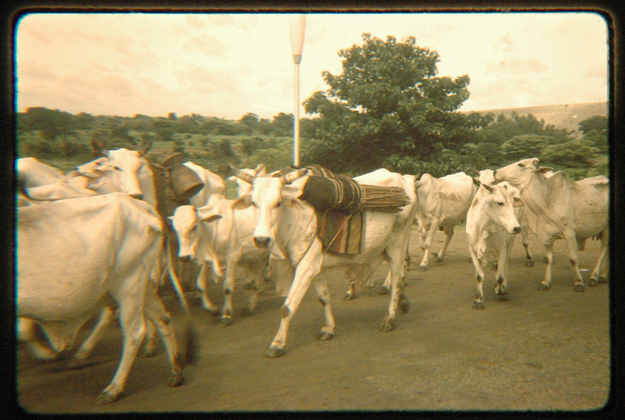Both the arts and sciences have carried out extensive research into the issues of mobility and space. Both fields use new media such as GPS and GIS to back up their research. As a result the more recent research into mobility and space has been given a big boost. Both art and science now need each other as never before. The ‘Mobile Habits’ workshop brings artists, designers and scientists together and challenges them to exchange concepts and new working methods in relation to space, place and mobility.
Locative media artists and designers are opening themselves up to theories about mobility and space from the worlds of anthropology and social and at the same time social scientists are discovering the different cartographic and visualisation techniques found in the world of art and media design.
Mobile Lifestyles
Esther Polak is an artist working in the field of ‘locative media’. She is currently researching the possibilities of setting up a project in Nigeria with the Fulani, West African nomadic cattle farmers. Her initial research came up with a variety of people and researchers, including vets, anthropologists and social geographers, with a shared interest in mobile lifestyles. These various fields have come up with a number of innovative practical and theoretical tools that could be used to set up a project proposal with a well thought out, interdisciplinary basis.
Talkshop
The guests will take part in a 'talk show' hosted by Esther Polak. She'll try to find out what inspires artist Christian Nold, by asking his opinion of a few pieces of art that are drastically changing the way we think about mobility and how to visualise it. With Hanne Kirstine Adriansen she'll talk about the complex relationship between mobile lifestyles and the way we experience identity. She'll join up with Ad Drent for a Q & A on social theories on mobility, and will ask him about the use of GPS data to create new models for the relationship between mobility and environmental factors.
The participants will spend the afternoon in a workshop setting, coming up with their own concepts based on the issues dealt with in the talk show. The starting point will be the route they took from home to the workshop. The idea is that by visualising and re-assessing the route they can put the concepts in to practice and be inspired.
Participants
Taking part in the workshop will be an interdisciplinary mix of media artists, designers and social scientists (anthropologists, social geographers) working in the field of place, mobility, storytelling and visualisation. In order to get a balanced interdisciplinary mix we ask to send a CV and short bio when applying to participate. Deadline june 8th 2006.
Date: 29 june 2006
Time: 9.30 - 17.30
Fee: 100 Euro, student discount fee 25 Euro
How to apply: send an email with your CV and short bio before the 8th of june 2006 to: info@virtueelplatform.nl
Speakers/support team:
Esther Polak
Esther Polak is a visual artist working in the field of new media. She is best known for two ‘locative media’ projects, AmsterdamREALTIME and the MILKproject. Both projects use GPS to ‘imagine’ the contemporary landscape. In both projects the participants were given a GPS tool to carry as they went about their daily lives. Their movements were mapped and the participants were asked to reflect upon the routes they had made. The projects resulted in large public installations. Esther Polak in constantly in search of new ways of researching space and can as such be seen as part of a long European tradition of ‘imagining the landscape’.
www.milkproject.net
www.waag.org/realtime
Christian Nold
Christian Nold is an artist and cultural activist who has spent the past few years mapping human emotions in the urban landscape. His research project is called Biomapping. It looks at the various ways that we as individuals can obtain information about our own body. Security technology has brought about a situation in which we are losing ownership over our own body and health. This project aims to give people access to their own biodata, to interpret and share it.
www.softhook.com
biomapping.net
Hanne Kirstine Adriansen
Hanne Kirstine Adriansen is a senior research fellow at the Danish Institute for International Studies.
Her training is in human geography and she has fieldwork experience from West Africa and the Middle East. Her research interests include pastoralists and their use of mobility, dryland management, and community development. She takes special interest in understanding different people's perception of concepts such as space and place.
Ab Drent
Ab Drent is a Master of Science in Rural Development and Management of Natural Resources in the tropics. His disciplinary specialisation is anthropology and ecology.
He has followed afoot over more than 500 km nomadic Fulani herders in the Extreme North of Cameroon during ten months. Drent has written an extensive case study about the transhumance cycle of a nomadic group and tested the suitability of traditional social theories to describe the relation between man and nature. He proposes two Actor Oriented approaches and Actor Network Theory as better suited to describe the complexity and unpredictability of nomadic mobility. In a related quantitative study Drent used GPS data to build a Correlated Random Walk model to investigate the relation between mobility and environmental factors. Currently he is preparing a project with Esther Polak to visualize nomadic mobility in alternative ways combining science and art.
